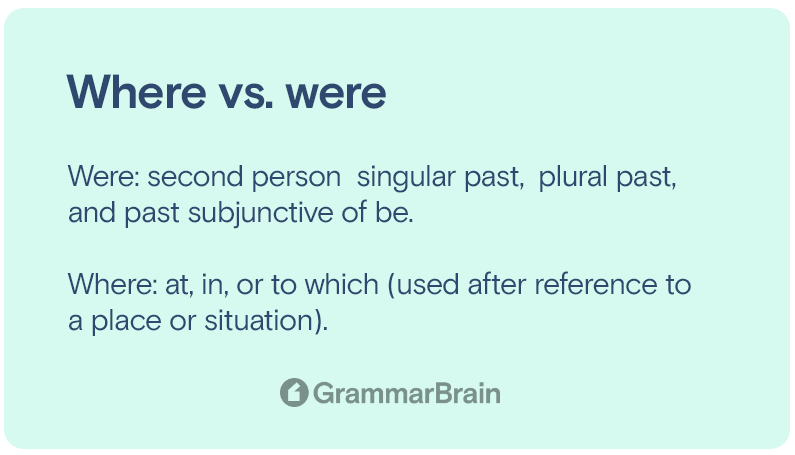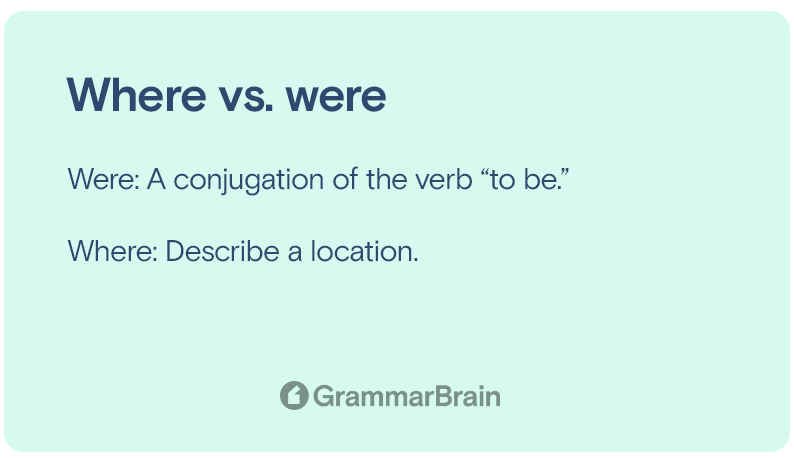The terms ‘where’ and ‘were’ may sound similar, but they are never synonymous, and neither may be used interchangeably. In this article, we’ll explore the difference between the terms “where” and “were” and their definitions and proper usage.
The word ‘where’ is commonly used as an adverb to ask queries regarding directions or location. ‘Where’ is also used to enquire about something’s position or condition/situation. Whereas the word ‘were’ is commonly used with plural objects, or the word ‘you’ and used as a past form of the verb’s ‘be’ form.
“Where” and “were”—meaning and definition
“Where” is used to refer to a location or occurrence of a situation. It is often used to pose a question, but it may also be used in phrases to convey knowledge of a location, situation, or occurrence. “Waa-ha-ir” is how it is pronounced.
“Were” is used in the simple past of the verb “to be.” This term can be used as an inquiry or a statement either in the sentence’s first, second, or third-person plural form. It is pronounced as “wu-h-r.” (Think of the word “fur”)
| Word | Definition |
| Were (verb) | second person singular past, plural past, and past subjunctive of be. |
| Where (adverb) | at, in, or to which (used after reference to a place or situation). |
| Where (conjunction) | that, whereas. |
Difference between “where” and “were”
“Where” is an adverb and a subordinating conjunction, while were is only a verb. Where and Where are two separate terms with distinct meanings.
‘Were’ is a verb, but ‘where’ is an adverb of time. ‘Where’ is a question word, whereas ‘were’ is a plural past tense word.
Where and were are not homophones (words with similar sounds or spellings). And their meanings and applications are entirely distinct. The word “were” is a past tense of the verb “to be.” “Where” is an adverb and conjunction that refers to a location.

Understanding the uses of “where” or “were”
Proper uses of the verb “were”
- Were used as “be” in the first person plural form We “were” dancing.
- “be” in the second person singular and plural (You “were” dancing.)
- “be” in the third person plural (They “were” dancing.)
- We may use were to convey anything hypothetical or imagined in the past subjunctive tense, for example, “If I ‘were’ you, I’d demand a raise.”
Proper use of “where” in sentences:
- Where is used as an adverb or pronoun in an interrogative to inquire about a place or location. Where is a question word.
- Whereas a conjunction denotes a certain location or time.
- Sometimes we use “where” to refer to a metaphorical location rather than an actual one. For example, you may say, “He irritated me to the point where I left the room.” In this situation, where does not refer to a physical location, but rather to a step in a process.
Examples of “where” and “were”
Examples of ‘where’ in sentences:
- People started glancing across the room to see where the sound was coming from.
- Where are you moving to?
- If you need to talk about something, he knows where to find me.
- Where will it end if they get their way?
Examples of the verb ‘were’ in sentences:
- As if atheism were a new religion, he believes in it.
- Tonight, we’re thinking about going to a jazz club.
- He may withdraw if he were allowed to keep a portion.
- What were you thinking when you did that?

How to remember which form to use
Remember that where rhymes with there, which gives you a clue to remember that is referring to a location, place, or time. The word “were” rhymes with fur, which will help you to remember that they are completely different words.
Another mnemonic is that “where” has an “h” in the word, that can remind you of the word “home.” Which refers to a place or a location.
“Where” vs “were” exercises
- I want to go over ____ the other children are playing.
- ____ you going to go to the park today?
- When ____ you going to tell me that you had failed your test the other day?
- ____ is the panda at the local zoo?
Answers:
- I want to go over where the other children are playing.
- Were you going to go to the park today?
- When were you going to tell me that you had failed your test the other day?
- Where is the panda at the local zoo?
Conclusion of “where” and “were”
The words ‘where’ and ‘were’ are not synonymous and cannot be used interchangeably. This article explains the distinction between ‘where’ and ‘were’ and their proper usage with examples.
Inside this article
Fact checked:
Content is rigorously reviewed by a team of qualified and experienced fact checkers. Fact checkers review articles for factual accuracy, relevance, and timeliness. Learn more.
Core lessons
Glossary
- Abstract Noun
- Accusative Case
- Anecdote
- Antonym
- Active Sentence
- Adverb
- Adjective
- Allegory
- Alliteration
- Adjective Clause
- Adjective Phrase
- Ampersand
- Anastrophe
- Adverbial Clause
- Appositive Phrase
- Clause
- Compound Adjective
- Complex Sentence
- Compound Words
- Compound Predicate
- Common Noun
- Comparative Adjective
- Comparative and Superlative
- Compound Noun
- Compound Subject
- Compound Sentence
- Copular Verb
- Collective Noun
- Colloquialism
- Conciseness
- Consonance
- Conditional
- Concrete Noun
- Conjunction
- Conjugation
- Conditional Sentence
- Comma Splice
- Correlative Conjunction
- Coordinating Conjunction
- Coordinate Adjective
- Cumulative Adjective
- Dative Case
- Determiner
- Declarative Sentence
- Declarative Statement
- Direct Object Pronoun
- Direct Object
- Diction
- Diphthong
- Dangling Modifier
- Demonstrative Pronoun
- Demonstrative Adjective
- Direct Characterization
- Definite Article
- Doublespeak
- False Dilemma Fallacy
- Future Perfect Progressive
- Future Simple
- Future Perfect Continuous
- Future Perfect
- First Conditional
- Irregular Adjective
- Irregular Verb
- Imperative Sentence
- Indefinite Article
- Intransitive Verb
- Introductory Phrase
- Indefinite Pronoun
- Indirect Characterization
- Interrogative Sentence
- Intensive Pronoun
- Inanimate Object
- Indefinite Tense
- Infinitive Phrase
- Interjection
- Intensifier
- Infinitive
- Indicative Mood
- Participle
- Parallelism
- Prepositional Phrase
- Past Simple Tense
- Past Continuous Tense
- Past Perfect Tense
- Past Progressive Tense
- Present Simple Tense
- Present Perfect Tense
- Personal Pronoun
- Personification
- Persuasive Writing
- Parallel Structure
- Phrasal Verb
- Predicate Adjective
- Predicate Nominative
- Phonetic Language
- Plural Noun
- Punctuation
- Punctuation Marks
- Preposition
- Preposition of Place
- Parts of Speech
- Possessive Adjective
- Possessive Determiner
- Possessive Case
- Possessive Noun
- Proper Adjective
- Proper Noun
- Present Participle
- Prefix
- Predicate



